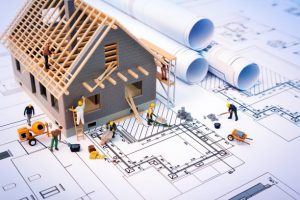How Long Does Each Stage of House Build Take?
Building a house is an exciting and complex process that involves several stages. If you’re considering building your dream home, it’s essential to understand the timeline and duration of each stage. This article will guide you through the various phases of house construction and provide insights into the time required for each step.
1. Pre-construction Planning and Design (Duration: 2-6 months)
The initial stage of a house build is the planning and design phase. This is a critical step as it sets the foundation for the entire construction process. During this stage, you’ll work with architects, engineers, and contractors to create a detailed plan for your new home. Here’s a breakdown of the key activities and the estimated time each takes:
Site Selection and Assessment
The first step is to choose a suitable location for your home. Factors like proximity to amenities, schools, work, and environmental considerations play a role in site selection. Depending on the availability of land and your preferences, this can take anywhere from a few weeks to a few months.
Architectural Design
The architectural design involves translating your vision and requirements into a detailed plan. This phase may take around 1 to 2 months, including multiple iterations and consultations with the architect.
Engineering and Structural Planning
After finalizing the architectural design, the structural engineering plans are developed. This stage ensures that your home will be safe, sturdy, and compliant with building codes. It may take 2 to 4 weeks to complete.

Obtaining Permits and Approvals
Before construction can begin, you’ll need to obtain necessary permits and approvals from local authorities. This process can be time-consuming, ranging from a few weeks to a couple of months, depending on the location and regulations.
2. Foundation and Framing (Duration: 2-4 months)
Once the planning and design are in place, it’s time to break ground and start building the foundation. This phase lays the groundwork for the entire structure. The duration for the foundation and framing stage can vary depending on the size and complexity of the house, as well as the availability of skilled labor.
Site Preparation
Before the foundation can be poured, the site must be cleared, graded, and leveled. This may involve removing trees, rocks, and debris. Site preparation usually takes a few weeks to a month.
Foundation Construction
The foundation is a critical component of the house, and its construction can take 1 to 2 months. Factors such as weather conditions and the type of foundation (e.g., slab, crawl space, or basement) can influence the timeline.
Framing the Structure
Once the foundation is ready, the framing of the house begins. This involves erecting the skeleton of the building with walls, floors, and roofs. Framing usually takes 1 to 2 months, depending on the complexity of the design and the size of the crew.
Roofing and Exterior Enclosure
After the framing is complete, the roof is installed, and the exterior walls are enclosed. This stage protects the interior from the elements and can take a few weeks to a month.

3. Plumbing, Electrical, and HVAC (Duration: 2-3 months)
Once the house is weather-tight, it’s time to focus on the internal systems that make it livable and functional. This stage includes the installation of plumbing, electrical wiring, and heating, ventilation, and air conditioning (HVAC) systems.
Plumbing Installation
Plumbing involves installing water supply lines, drains, sinks, faucets, toilets, and other fixtures. The duration may vary depending on the complexity of the plumbing system and the size of the house. This phase generally takes 1 to 2 months.
Electrical Wiring
The electrical wiring is a crucial aspect of the construction process. Electricians will install wiring, outlets, switches, and lighting fixtures throughout the house. The electrical work may take 1 to 2 months, depending on the size and complexity of the electrical system.
HVAC System Installation
The HVAC system ensures your home has proper heating and cooling. This phase involves installing ductwork, vents, and the HVAC unit. The duration for HVAC installation is typically around 1 to 2 months. https://citibuildconstruction.com.au/
Insulation and Drywall
Before the interior finishes are applied, insulation is installed to regulate temperature and improve energy efficiency. Drywall is then hung and finished to create smooth walls. This stage may take 2 to 3 weeks.
4. Interior Finishes (Duration: 2-4 months)
The interior finishes give your home its unique style and personality. This phase includes installing flooring, cabinets, countertops, and painting.
Flooring
The flooring installation can take anywhere from a few days to a few weeks, depending on the type of flooring material and the area covered.
Cabinetry and Countertops
Installing kitchen and bathroom cabinets, as well as countertops, may take 2 to 4 weeks, depending on the complexity and size of the kitchen and bathrooms.
Interior Painting and Trim Work
Painting the walls and applying trim can take 2 to 4 weeks, depending on the number of rooms and the intricacy of the trim.
Final Touches
The final touches include installing fixtures, hardware, and other accessories to complete the look of your home. This stage may take 1 to 2 weeks.
5. Final Inspections and Closing (Duration: 2-4 weeks)
Before you can move into your new home, it must pass a series of inspections to ensure it meets all safety and building code requirements. The final stage of the house build includes:
Inspections
Various inspections will be conducted to verify that the construction adheres to local regulations. These inspections may cover structural integrity, electrical systems, plumbing, and HVAC.
Final Walkthrough and Punch List
A final walkthrough is done with the builder to identify any issues or deficiencies. A punch list is created, outlining the items that need to be addressed before closing.
Closing and Handover
After completing the inspections and addressing any outstanding items, the house is ready for closing. The keys to your new home are handed over, and the construction process is officially complete.
Conclusion
Building a house is a time-consuming process that involves several stages, each requiring careful planning and execution. From the initial design and site selection to the final inspections and handover, understanding the timeline of each stage will help you manage your expectations and stay informed throughout the construction journey. By knowing the approximate duration of each stage, you can better plan for the construction process and anticipate any potential delays. Remember that these timelines are estimates and may vary based on factors such as weather conditions, labor availability, and the complexity of your project.
Throughout the house build, it’s essential to maintain open communication with your builder and contractors. Regular updates and progress reports will keep you informed about the status of the construction and any adjustments to the timeline.
